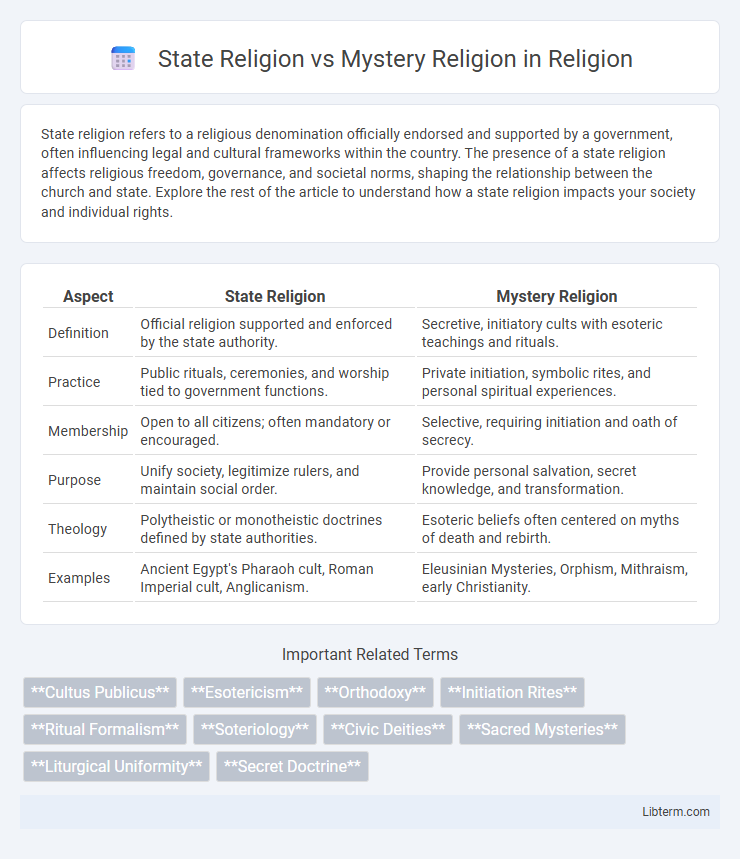State religion refers to a religious denomination officially endorsed and supported by a government, often influencing legal and cultural frameworks within the country. The presence of a state religion affects religious freedom, governance, and societal norms, shaping the relationship between the church and state. Explore the rest of the article to understand how a state religion impacts your society and individual rights.
Table of Comparison
| Aspect | State Religion | Mystery Religion |
|---|---|---|
| Definition | Official religion supported and enforced by the state authority. | Secretive, initiatory cults with esoteric teachings and rituals. |
| Practice | Public rituals, ceremonies, and worship tied to government functions. | Private initiation, symbolic rites, and personal spiritual experiences. |
| Membership | Open to all citizens; often mandatory or encouraged. | Selective, requiring initiation and oath of secrecy. |
| Purpose | Unify society, legitimize rulers, and maintain social order. | Provide personal salvation, secret knowledge, and transformation. |
| Theology | Polytheistic or monotheistic doctrines defined by state authorities. | Esoteric beliefs often centered on myths of death and rebirth. |
| Examples | Ancient Egypt's Pharaoh cult, Roman Imperial cult, Anglicanism. | Eleusinian Mysteries, Orphism, Mithraism, early Christianity. |
Defining State Religion and Mystery Religion
State religion refers to an officially endorsed or established religion by a government, often integrated into the laws and political institutions of a society, shaping public rituals and moral codes. Mystery religion, in contrast, denotes secretive cults or spiritual systems in the ancient world centered on esoteric knowledge, initiation rites, and personal salvation experiences inaccessible to outsiders. These distinct religious frameworks highlight the difference between public, institutionalized worship and private, mystical devotion.
Historical Origins of State Religions
State religions historically originated as centralized systems established by ruling authorities to unify populations and legitimize political power through official worship practices, as seen in ancient Egypt's veneration of Ra and Mesopotamia's temple-centric cults. These religions often integrated governance and theology, codifying religious doctrines within legal frameworks to reinforce social hierarchies and state stability. In contrast, mystery religions emphasized personal salvation through secret rites and esoteric knowledge, operating parallel to or outside state-controlled religious institutions.
Roots and Development of Mystery Religions
Mystery religions originated in the ancient Mediterranean, emphasizing secretive rituals and personal salvation, distinct from state religions that prioritized communal worship and political unity. Rooted in Mesopotamian, Egyptian, and later Hellenistic traditions, these religions developed through initiation ceremonies and esoteric knowledge that promised individual spiritual transformation. Their growth paralleled the decline of state religions by addressing personal religious experiences and offering a direct connection to the divine beyond the formal, public rites of established state cults.
Core Beliefs and Practices: A Comparative Overview
State religions center on formalized doctrines endorsed by governments, often emphasizing rituals that reinforce social order and political authority. Mystery religions focus on secretive initiation rites, personal spiritual experiences, and esoteric knowledge aimed at individual transformation and salvation. Core practices in state religions include public worship and doctrinal conformity, whereas mystery religions prioritize confidential ceremonies and mystical communion with deities.
Authority Structures: Centralized vs Esoteric
State religions are characterized by centralized authority structures, often governed by formal institutions such as priesthoods or government bodies that enforce doctrinal conformity and public rituals. In contrast, mystery religions operate through esoteric authority, where knowledge and initiation rites are closely guarded secrets shared among select initiates, creating a decentralized and personalized spiritual experience. This divergence in authority highlights the public, uniform nature of state religions versus the exclusive, experiential focus of mystery religions.
Role in Society and Political Influence
State religions often function as official systems of worship sanctioned by government authorities, shaping public morals, laws, and state identity by reinforcing political power and social cohesion. Mystery religions, with their secretive rites and individual spiritual experiences, typically operate outside formal political frameworks, offering personal salvation and exclusive knowledge that foster close-knit communities but limited direct influence on state governance. While state religions legitimize rulers and unify populations through shared rituals, mystery religions emphasize personal transformation, appealing to marginalized groups seeking alternative spiritual meaning beyond political structures.
Initiation and Membership: Open vs Secret
State religions often feature open membership and public rituals that reinforce social cohesion and political authority, allowing citizens to participate without secretive barriers. Mystery religions require secret initiation rites and exclusive membership, emphasizing personal spiritual transformation and hidden knowledge accessible only to initiated individuals. This distinction highlights the public, communal nature of state religions versus the private, esoteric focus of mystery religions.
Rituals and Sacred Ceremonies
State religions emphasize public rituals and sacred ceremonies that reinforce social order and political authority, often held in prominent temples or state-controlled venues. Mystery religions center on secretive, initiatory rituals that promise personal transformation and spiritual enlightenment, typically conducted in private or exclusive settings. The distinct focus on communal versus individual experience defines the ritualistic contrast between state and mystery religions.
Impact on Culture and Art
State religions profoundly influenced cultural identity, shaping public art, architecture, and festivals that reinforced political authority and social cohesion. Mystery religions offered more personalized spiritual experiences, inspiring intricate symbolism, secret rites, and private artworks that emphasized individual salvation and emotional connection. The contrast between public, monumental expressions in state religions and intimate, esoteric art in mystery religions highlights their distinct roles in cultural development.
Legacy and Modern Perceptions
State religions established centralized worship systems that shaped national identities and legal frameworks, leaving a legacy evident in contemporary religious institutions and cultural traditions. Mystery religions, with their secretive rituals and personal salvation focus, influenced modern spiritual movements and esoteric practices by emphasizing individual mystical experiences. Today, state religions are often associated with formal authority and governance, while mystery religions inspire alternative spiritualities and hidden knowledge seekers.
State Religion Infographic

 libterm.com
libterm.com